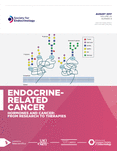mTOR inhibitors response and mTOR pathway in pancreatic neuroendocrine tumors
- Simona Falletta1,
- Stefano Partelli2,
- Corrado Rubini3,
- Dominik Nann4,
- Andrea Doria3,
- Ilaria Marinoni4,
- Vanessa Polenta2,
- Carmelina Di Pasquale1,
- Ettore degli Uberti1,
- Aurel Perren4,
- Massimo Falconi2 and
- Maria Chiara Zatelli1⇑
- 1Department of Medical Science, Section of Endocrinology and Internal Medicine, University of Ferrara, Ferrara, Italy
- 2Pancreatic Surgery Unit, Pancreas Translational and Research Institute, San Raffaele Hospital, Vita-Salute San Raffaele University, Milan, Italy
- 3Department of Biomedical Sciences and Public Health, Polytechnic University of Marche, Ancona, Italy
- 4Institut fur Pathologie, University of Bern, Bern, Switzerland
- Correspondence should be addressed to M C Zatelli; Email: ztlmch{at}unife.it
Abstract
Medical therapy of pancreatic neuroendocrine tumors (P-NET) may take advantage of Everolimus treatment. However, the extent of therapeutic response cannot be predicted. This study was aimed to identify the possible predictive markers of response to Everolimus in P-NET. We found that Everolimus reduced the cell viability and induced apoptosis in primary cultures of 6 P-NET (P-NET-R), where the proliferative and antiapoptotic effects of IGF1 were blocked by Everolimus. On the contrary, 14 P-NET primary cultures (P-NET-NR) were resistant to Everolimus and IGF1, suggesting an involvement of PI3K/AKT/mTOR pathway in the mechanism of resistance. The response to Everolimus in vitro was associated with an active AKT/mTOR pathway and seemed to be associated with a greater clinical aggressiveness. In addition, a patient sensitive to Everolimus in vitro was sensitive to this drug in vivo also and showed a positive p-AKT immunohistochemistry (IHC) at tissue level. Similarly, a patient resistant to Everolimus treatment after surgery was not sensitive to the drug in vitro and had a negative p-AKT IHC staining. Therefore, present data confirm that P-NET primary cultures may be considered a model for testing medical treatment efficacy and that IHC characterization of p-AKT might help in identifying human P-NET who can benefit from Everolimus treatment. These data encourage conducting a prospective multicenter study involving different groups of P-NET patients treated with Everolimus.
- Received 21 September 2016
- Accepted 3 October 2016
- Made available online as an Accepted Preprint 3 October 2016
- © 2016 Society for Endocrinology












